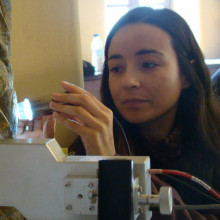

Papliaka Zoi Eirini is a chemist and holds a PhD along with a MSc in Conservation Science of Artworks and Monuments. Her excellence in the field was rewarded by the State Scholarships Foundation.
During her PhD and MSc research activity she collaborated with The State Museum of Contemporary Art and The Macedonian Museum of Contemporary Art in Thessaloniki (Greece), studying the materials encountered in their collections of pictorial artworks and consulting museum curators to select appropriate environmental conditions during display and storage as well as to apply the most appropriate conservation treatments.
Her first post doc research was held at Elettra Sincrotrone-Trieste, Italy. Her research was mainly focused on improving FTIR imaging speciation of organic compound residues or their degradation products in the stratigraphy of archaeological wall painting samples.
During her second post doc research at the Institute of Electronic Structure and Laser of the Foundation for Research and Technology-Hellas (IESL-FORTH), she gained an in-depth expertise in portable laser spectroscopic instruments for the in-situ characterization of artworks and monuments. The developed methodology has been successfully applied for the physicochemical characterization of Artworks in Museums and Monuments situated in rural locations in the greater Heraklion area.
Since 2019 she works as a chemist at the Laboratory of Wastewater Management and Treatment of the Municipal Water Supply and Sewerage Company of Volos (DEYAMV).
Her main activity is the accurate quantitative measurement of wastewater constituents during various stages of treatment, as accurate analyses make it possible to track the effectiveness of the purification process.
Education
- 2009, PhD in Conservation Science, Faculty of Engineering, Aristotle University of Thessaloniki (A.U.Th.), Greece.
- 2006, MSc in Conservation Science, Faculty of Engineering, Aristotle University of Thessaloniki (A.U.Th.), Greece.
- 2003, BSc Degree of Chemistry, Department of Chemistry, Aristotle University of Thessaloniki (A.U.Th.), Greece.
Career
- 01/09/2019 to present, Chemist, Municipal Water Supply and Sewerage Company of Volos (DEYAMV), Greece.
- 01/11/2014 -31/10/2015, Postdoc Researcher, Institute of Electronic Structure and Laser (IESL-FORTH), Greece.
- 01/09/2012-15/09/2014, Postdoc Researcher, Elettra - Sincrotrone Trieste, Italy.
- 1/06/2006 - 15/12/2008, Conservation Scientist, Aristotle University of Thessaloniki (A.U.Th.) Greece.
Interests
- Conservation Science of Artworks
- Development of new methodological approaches in Cultural Heritage research
- In-situ analysis
- Heritage science diagnostics
Awards/Prizes/Distinctions
- Scholar of the State Scholarships Foundation (IKY) for MSc and PhD training (2004-2009)